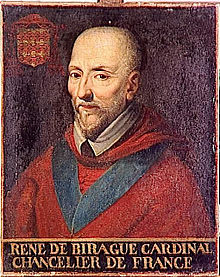René de Birague

René de Birague (original name: Renato Biragro; 2 February 1506 – 24 November 1583) was an Italian patrician who became a French cardinal and chancellor.
Biography
Born at Milan, he was the son of Giangiacomo Galeazzo Birago, ambassador of the duke of Milan in France, and Anna Trivulzio. Sent to papal Avignon, he cut his studies short to take up family duties at the unexpected death of his father. As a doctor of law he was admitted to the Collegio d'avvocati of Milan in 1536. After the battle of Pavia (1525), when the French and their sympathizers were expelled from Milan, he and his three brothers, Louis, Pierre and Charles, escaped to France to avoid the vengeance of Francesco II Sforza, duke of Milan. Declared a traitor by the Spanish government in Milan, his properties were confiscated in 1536 (they were partially restored in 1556).
Francis I of France named him counselor of the parlement de Paris. Later, during French control of Piedmont, he was Maestro delle Richieste of the Parliament of Turin, (1539) and its president in 1543.
He married Valentina Balbiano (1518–1572), with whom he had two children, but after her death he took minor orders in Milan. Made president of the Superior Council of Pinerolo on 9 January 1563, then French ambassador to the Council of Trent in April, he was appointed Francis's ambassador to Emperor Ferdinand I in June and then to Maximilian, king of the Romans.
He obtained a brevet of naturalization, September 1565, taking the name René de Birague, and his political career at the court of Charles IX advanced rapidly. He accompanied the king in his trip to Guyenne and served as procurator and lieutenant general in Lyon and other places September 1565 until 1568. Lyon, the scene of violence Protestant and Catholic clashes, was largely controlled by a deeply resented Italian economic elite.
Closer to the court, he became Superintendent of Finances, 1568–1570. Knight of the Order of Saint-Michel, and eventually Commander of the Order of Saint-Esprit, (1579).
In 1570, Charles IX named him keeper of the seals, a post that gave him a seat in the secret council. Thus, by virtue of his post, he attended the secret meeting of the council that decided upon the St. Bartholomew's Day Massacre of Huguenots on 24 August 1572; he was in the King's chamber with the dukes of Guise and Nevers, Tavannes and Retz, when Queen Catherine de' Medici arrived to determine the king, who was undecided. Birague was named chancellor of France as a reward for his participation on 17 March 1573; he was also promoted to the cardinalate on 21 February 1578 [1] under the insistence of Henry III, though he never went to Rome to receive the red hat. He is alleged to have said that he was a cardinal without a title, a priest without benefices and a chancellor without the seal (Berton, Dictionnaire des cardinaux, quoted),[2]
He died at Paris in 1583. His tomb included his portrait as a kneeling figure by Germain Pilon, who also executed the funeral cadaver portrait of his wife (both now in the Louvre Museum).[3]
Sources
- Cardinals of the Holy Roman Church: René de Birague
